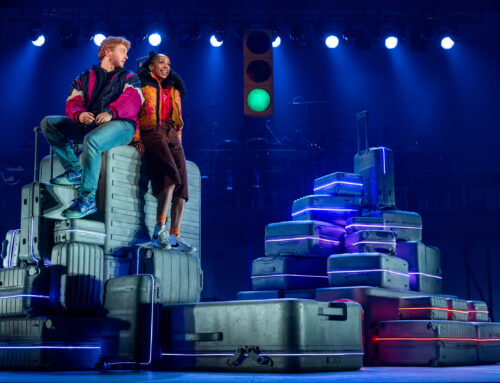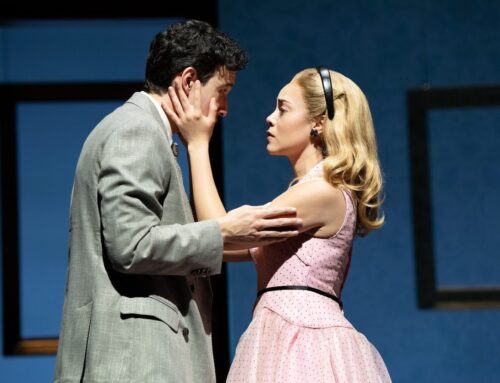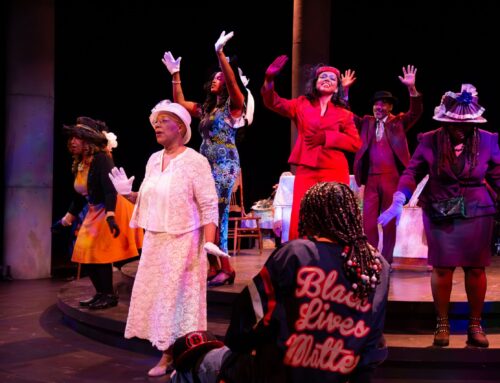A few bedraggled Kit Kat Chorines milled around onstage as the audience filed in to see the iconic Kander and Ebb musical that had its 1966 pre-broadway premiere right here in Boston. Now, more than a half century later the Boston Opera House welcomes the Roundabout Theatre Company’s pivotal Tony Award-winning production of CABARET — and trust me: this is no walk in the park, old chum, not that CABARET ever was; but this production will raise the hair on the back of your neck. It remains a chilling, cautionary tale for right now.
It all begins with the Emcee who sets the tone and pace as he sneaks his hand out from behind the curtain and slinks out slowly to croon “Willkommen” with a wink and a sneer. Randy Harrison raises the part to new heights. Standing on the shoulders of Emcees before him, among them Joel Grey and Alan Cumming, Harrison is funnier than the former, more vulnerable than the latter, and guides us oh-so-gingerly over the precipice of an era poised between the roaring 20’s and 1930’s pre-Nazi Berlin.
Soon he introduces us to the Kit Kat Girls in underwear and torn stockings, and Kit Kat Boys naked beneath suspenders who proceed to unleash a bawdy, opening number that turns the Opera House into a seedy, smoke-filled back room. Over the next two hours this extraordinary ensemble of wasted, wanton and world- weary decadents perform with a vengeance, trying too hard to keep the “prophet of doom” away. Never was singing and dancing put to more terrifying use.
Originally directed by Sam Mendes and co-directed & choreographed by Rob Marshall in 1998, this first rate touring production is brilliantly directed by BT McNicholl, its muscular choreography recreated by Cynthia Onrubia on a darkened, two-tiered stage with a live orchestra above and the Kit Kat Club mainstage below. It is here we meet good time gal Sally Bowles who belts her hungry heart out, and sleeps with every man she meets– hoping to hit the jackpot.
Enter American wannabe novelist Clifford Bradshaw, a babe in the woods without a dime in his pocket who falls hard for Sally and she for him. Benjamin Eakeley is merely serviceable in the part of this new world naif with fluctuating sexual preference. But tiny Andrea Goss gives it her all, a keyed up kewpie doll with black eyes and a wavering English accent. She lacks a certain vulnerability that keeps us from loving her, but replaces it with an ominous desperation, and she brings the house down in the climactic rendition of the titular song in a voice as desolate and hollow as the joy Sally doesn’t have.
They move in together at Fraulein Schneider’s run-down rooming house. But there’s nothing run-down about Mary Gordon Murray’s performance as the spinster landlady; her soaring, truly commanding voice threatened to stop the show more than once, while her gentle grace endeared her to us and her sweet, affectionate lover Herr Schultz. His Jewish roots will make the couple a target of the mounting Nazi threat. The fine-voiced Scott Robertson brings great warmth and charm to the role and we ache for him as he declares his faith in the future with his blind confidence that this waive of antisemitism will pass; after all, he’s German.
As this cabaret unfolds, its “Kick Line” grows sinister, and songs like “If You Could See Her,” “What would You Do,” and “I Don’t Care Much” are laced with mounting hostility, fear, and alienation. Scene by scene a creeping sense of deja vu is inescapable as the songs grow more sinister and resonate in the current atmosphere of rising nationalism and fear of outsiders. The culminating moments went through the audience like an electric shock.
This is a CABARET for the ages, a stinging reminder of a dark past and the long shadow it casts. So “Put down the knitting, the book and the broom/Come hear the music play!” You can decide if “Tomorrow belongs to you.”
DO NOT MISS: CABARET Two weeks only at the Boston Opera House through February 12.






Leave A Comment
You must be logged in to post a comment.